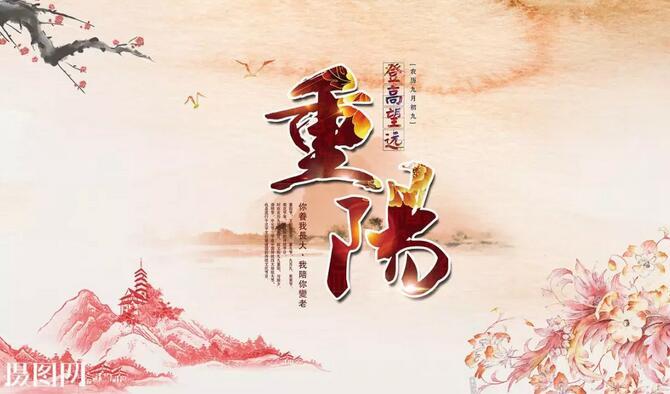The Double Ninth Festival is the traditional Chinese festival for
the 9th day of the lunar calendar every year. In the Book of Changes,
"Nine" is set as a positive number. On September 9th, two or nine are
heavy, so "Chongyang"; because the day and the moon are both nine, it
is also called "heavy nine." The ancients believed that Chongyang was an
auspicious day worth celebrating. Ancient folks have the custom of
ascending and praying for the Double Ninth Festival. Celebrating the
Double Ninth Festival generally includes activities such as ascending,
sun-bathing, and chrysanthemum. Since its inception, it has added
connotations such as respecting the elderly and enjoying the feast of
the Chongyang Day (respecting the feast). Grateful and respectful.
Chongyang and New Year's Eve, Qingming and Zhongyuan are also called
the four traditional Chinese ancestral festivals. "Nine" is the largest
number in the number. It has the meaning of longevity and longevity,
and it is a blessing to people's health and longevity. On September
9th, 1989, the Lunar New Year was designated as the "Respect for the
Elderly", advocating the whole society to establish a culture of
respecting the elderly, respecting the elderly, loving the elderly, and
helping the elderly. On May 20, 2006, the Double Ninth Festival was
listed by the State Council as the first batch of national intangible
cultural heritage.

As the traditional festival of our country, the Double Ninth Festival has a long history and was first mentioned in the works of the Southern and Northern Dynasties. In the Three Kingdoms period, Wei Wendi Cao Yu's "Nine Days and Zhong Yushu" has written a banquet for Chongyang: "Years come to the moon, and September 9th. Nine is the number of the sun, and the sun and the moon should be, the vulgar The name is thought to be suitable for a long time, so it is a feast for high-level banquets." At this time, the banquet was held on the day of September 9th to celebrate the festival. In the Wei and Jin Dynasties, there was a custom of enjoying chrysanthemums and drinking, which was reflected in Tao Yuanming's works. In the Tang Dynasty, the Double Ninth Festival was designated as a formal holiday. Since then, the whole country has celebrated the Double Ninth Festival and held various events during the festival. In the Ming Dynasty, in September, the emperor had to personally go to the Longevity Hill to climb the high to Changqiu. In the Qing Dynasty, this custom was still prevalent.







 selena
selena  sales@msrelay.com
sales@msrelay.com 13968707033
13968707033
 +86-577-62518811
+86-577-62518811





